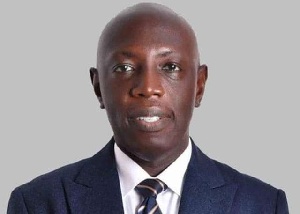- Home - News
- Elections 2024
- News Archive
- Crime & Punishment
- Politics
- Regional
- Editorial
- Health
- Ghanaians Abroad
- Tabloid
- Africa
- Religion
- Photo Archives
- Press Release
General News of Thursday, 5 June 2025
Source: www.ghanawebbers.com
GPRTU threatens nationwide strike over new GH¢1 fuel levy
The country is facing a crisis. Commercial transport operators plan a nationwide strike. This strike will start on Tuesday, June 10, 2025.
The operators are protesting against a new GH¢1 levy on fuel. They believe this levy could harm their livelihoods and raise fares for commuters.
At a press conference in Accra on June 5, Abass Ibrahim Imoro spoke for over 200,000 drivers and vehicle owners. He condemned the levy as a "unilateral decision" made without proper consultation. He warned it would cause "untoward hardship" in the transport sector.
Imoro explained that the GH¢1 increase per litre means a 6.7% rise in operational costs. This is based on an average fuel price of GH¢15 per litre. He noted that transport operators have already faced a 15-20% rise in spare parts and maintenance costs over the past year.
He added that this new levy might force fare hikes of 10-15%. Over 60% of urban Ghanaians rely on public transport daily and cannot afford this burden.
The GPRTU and other transport associations want an immediate reversal of the levy. They also seek engagement with the government and stakeholders to discuss solutions.
Imoro stated, "We call on the government to reverse the levy immediately." He set an ultimatum: if their demands are ignored, they will park their vehicles on June 10, 2025.
He urged the government to consider how this levy affects the transport sector. He warned about potential catastrophic consequences for the economy if they do not engage in discussions.
The controversial levy is part of the Energy Sector Levy (Amendment) Bill, passed by Parliament this week. Finance Minister Dr. Cassiel Ato Forson argues that it will generate GH¢5.7 billion to reduce energy sector debt.
As of March 2025, this debt stands at US$3.1 billion. The Minister also mentioned needing an additional US$1.2 billion for fuel procurement throughout 2025.
He assured that recent gains by the Ghana Cedi would mitigate any immediate price increases at pumps. However, transport operators remain skeptical about these assurances.
They argue that any increase in fuel costs will lead to higher fares across all sectors of Ghana's economy. A nationwide strike could disrupt economic activity and supply chains significantly.
This situation presents an urgent crisis for the government as millions may be stranded without transportation.











